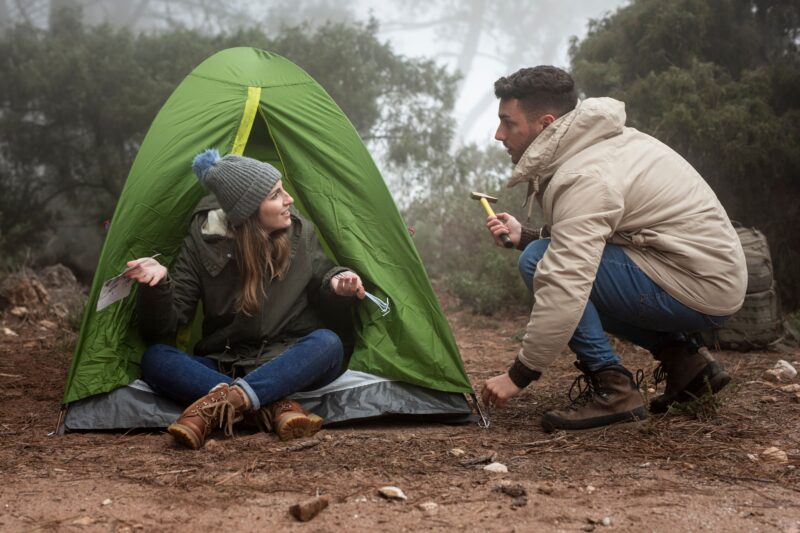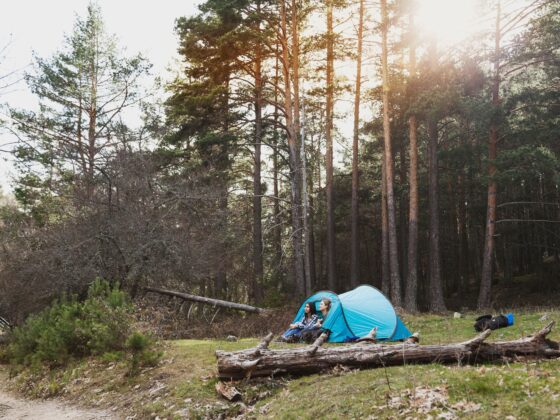Camping tents are the cornerstone of any successful outdoor adventure. They provide shelter, protection, and a cozy haven amidst the great outdoors. However, not all camping tents are created equal, and the choices you make can either make or break your camping experience. In this comprehensive guide, we’ll delve into the common pitfalls to avoid when selecting and maintaining your camping tent, ensuring you enjoy a hassle-free and memorable camping trip.
The Importance of Choosing a Heavy-Duty Tent
When it comes to camping tents, the adage “you get what you pay for” often holds true. Investing in a high-quality, heavy-duty tent can make all the difference in withstanding the rigors of the great outdoors. Cheap, flimsy tents may seem like a bargain, but they are more susceptible to damage, leaks, and even collapse in inclement weather. A sturdy, well-constructed tent not only provides superior protection but also offers greater longevity, ultimately saving you money in the long run.
Common Camping Tent Sins to Avoid
- Neglecting Tent Size: Choosing a tent that is too small for your group can lead to cramped, uncomfortable quarters, while a tent that is too large may be cumbersome to transport and set up. Carefully consider the number of occupants and their gear when selecting the appropriate tent size.
- Ignoring Weather Conditions: Failing to account for the weather conditions in your camping destination can result in a mismatched tent. A three-season tent may not withstand the harsh winds and heavy rains of a camping trip, while a four-season tent may be overkill for a summer excursion.
- Improper Tent Placement: Setting up your tent in a poor location can expose it to the elements, leading to potential damage or even a compromised camping experience. Avoid pitching your tent under overhanging branches, in low-lying areas prone to flooding, or on uneven ground.
- Inadequate Ventilation: Insufficient airflow within the tent can create a stuffy, uncomfortable environment, leading to condensation buildup and potential mold growth. Ensure your tent has adequate ventilation, such as mesh panels or adjustable vents, to maintain a comfortable and healthy atmosphere.
- Neglecting Tent Maintenance: Failing to properly care for your camping tent can significantly shorten its lifespan. Regular cleaning, waterproofing, and storage can help preserve the integrity of your tent, ensuring it remains in top condition for years to come.
- Incorrect Tent Pitching: Improperly setting up your tent can compromise its stability and structural integrity, leaving it vulnerable to the elements. Follow the manufacturer’s instructions carefully and utilize the appropriate tent pegs and guy lines to ensure a secure and sturdy setup.
- Underestimating the Importance of Tent Accessories: Overlooking essential camping gear, such as quality tent pegs, ground tarps, and storm guy lines, can leave your tent susceptible to damage and instability. Investing in the right accessories can enhance the overall performance and longevity of your camping tent.
Neglecting Tent Care: Why It’s Crucial for Longevity
Maintaining the cleanliness and condition of your camping tent is crucial for its longevity. Neglecting proper camping tent care can lead to a variety of issues, including:
- Decreased Waterproofing: Over time, the waterproof coating on your tent’s fabric can degrade, leaving it vulnerable to leaks and water damage. Regular cleaning and the application of a waterproofing solution can help restore and maintain the tent’s water-repellent properties.
- Mold and Mildew Buildup: Failure to properly dry and store your tent after use can result in the growth of mold and mildew, which can compromise the structural integrity of the fabric and pose health risks.
- Weakened Seams and Fabric: Improper handling, excessive wear and tear, and exposure to the elements can cause the seams and fabric of your tent to weaken, leading to tears and compromised structural integrity.
- Damaged Zippers and Poles: Neglecting the care and maintenance of your tent’s zippers and poles can result in malfunctions and breakages, rendering the tent unusable.
By dedicating time to proper tent care, including regular cleaning, waterproofing, and storage, you can extend the lifespan of your camping tent and ensure it continues to provide reliable shelter for your outdoor adventures.
Choosing the Right Tent Pegs for Your Camping Adventure
Tent pegs are often overlooked, but they play a crucial role in the stability and security of your camping setup. The type of tent pegs you choose should be tailored to the terrain and weather conditions of your camping destination. Consider the following factors when selecting the right tent pegs:
- Soil Composition: Different soil types, such as sand, rocky terrain, or soft earth, require specific tent pegs that can effectively anchor into the ground. Metal pegs work well in hard, compact soil, while plastic or aluminum pegs may be more suitable for softer ground.
- Weather Conditions: In windy or stormy conditions, heavier-duty tent pegs, such as those made of steel or titanium, can provide superior anchoring and prevent your tent from being blown away. Conversely, for mild weather, lightweight pegs may be sufficient.
- Tent Design: Some tents come with specialized pegs that are optimized for their specific setup. Ensure you use the recommended tent pegs to maintain the structural integrity of your camping shelter.
By carefully selecting the appropriate tent pegs for your camping environment, you can ensure your tent remains securely anchored, even in the face of adverse weather conditions.
Essential Camping Gear Guide for a Successful Trip
Preparing for a camping trip goes beyond just choosing the right tent. To ensure a smooth and enjoyable experience, consider the following essential camping gear:
- Sleeping Bag and Pad: Invest in a high-quality sleeping bag and pad that are rated for the expected temperature range of your camping destination. This will keep you warm and comfortable throughout the night.
- Camping Stove and Cookware: A reliable camping stove and the necessary cookware, such as pots, pans, and utensils, will allow you to prepare delicious meals in the great outdoors.
- Lighting and Lanterns: Portable lighting, such as headlamps, flashlights, and lanterns, are essential for navigating your campsite and creating a cozy ambiance after the sun sets.
- Navigation and Communication Devices: Bring a compass, map, and/or GPS device to ensure you can find your way, and consider a satellite phone or two-way radio for emergency communication in remote areas.
- First Aid Kit: A well-stocked first aid kit can provide the necessary supplies to address minor injuries and emergencies that may arise during your camping trip.
- Camping Chairs and Tables: Comfortable camping chairs and a sturdy table can transform your campsite into a cozy living space, allowing you to relax and enjoy your outdoor experience.
- Camping Cooler and Food Storage: Invest in a high-quality cooler to keep your perishable food and beverages fresh, and consider additional food storage containers to keep your campsite organized and pest-free.
By ensuring you have the right camping gear, you can focus on creating unforgettable memories and enjoying the great outdoors to the fullest.
Tips for Maintaining and Cleaning Your Camping Tent
Proper maintenance and cleaning of your camping tent are essential for preserving its condition and extending its lifespan. Follow these tips to keep your tent in top shape:
- Clean the Tent Regularly: After each camping trip, thoroughly clean your tent using a mild soap and lukewarm water. Avoid using harsh chemicals or abrasives, as they can damage the fabric and coatings.
- Dry the Tent Completely: Ensure the tent is completely dry before storing it. Dampness can lead to the growth of mold and mildew, which can compromise the integrity of the fabric.
- Inspect for Damage: Carefully inspect your tent for any tears, worn spots, or damaged components, such as zippers and poles. Address any issues promptly to prevent further deterioration.
- Waterproof the Tent: Apply a specialized tent waterproofing solution to the fabric every few years to maintain its water-resistant properties and prevent leaks.
- Store the Tent Properly: When not in use, store your tent in a cool, dry place, away from direct sunlight. Avoid folding or compressing the tent too tightly, as this can stress the fabric and coatings.
- Patch Minor Tears: If you encounter small tears or holes in your tent, use a tent repair kit to patch them and prevent further damage.
- Replace Worn Components: Regularly inspect and replace any worn or damaged components, such as tent poles, guy lines, and tent pegs, to ensure the overall integrity of your camping shelter.
By following these maintenance and cleaning tips, you can ensure your camping tent remains in top condition, ready to provide reliable shelter for your outdoor adventures for years to come.
Conclusion: Enjoying a Hassle-Free Camping Experience
Choosing the right camping tent and maintaining it properly are crucial steps in ensuring a successful and enjoyable outdoor experience. By avoiding the common “sins” outlined in this guide, such as neglecting tent size, ignoring weather conditions, and failing to properly care for your tent, you can confidently embark on your next camping trip with a reliable and durable shelter.
Remember, investing in a high-quality, heavy-duty tent and the necessary accessories can make all the difference in the comfort and safety of your camping experience. Additionally, dedicating time to proper tent maintenance and cleaning will extend the lifespan of your camping shelter, allowing you to create countless unforgettable memories in the great outdoors.
Ready to elevate your camping experience? Explore our selection of heavy-duty tents and essential camping gear to ensure a hassle-free adventure



